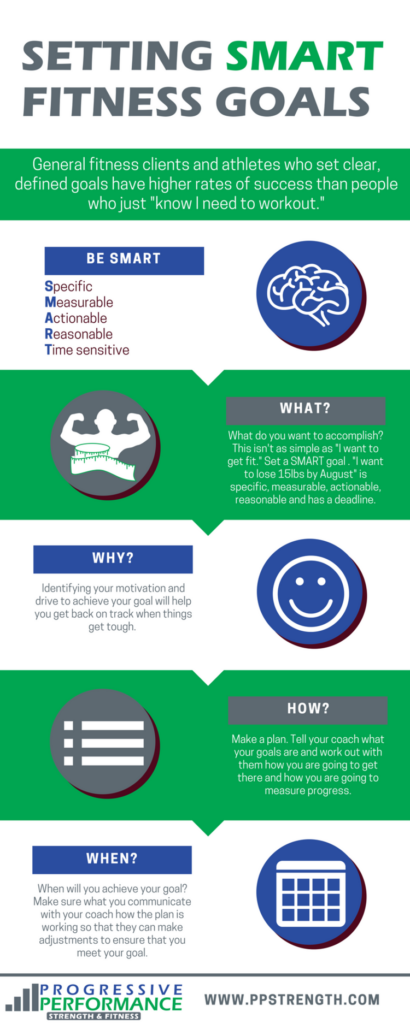I have been a coach for about 9 years now and one thing I can tell you is that the clients and athletes that have a clear picture of their goals have significantly higher rates of achieving success, than those who just “know they need to workout” or the clients that pay me for accountability alone.
Having that clear picture is the first step to achieving any goal. How do you know how well you are doing or how close you are getting to your goal if you don’t have a clear picture of it? This part is mostly up to you, but a coach can help by asking the right questions.
Table of Contents
ToggleSo I have some questions for you…
The first big question is what do you want to accomplish? This goal has to be SMART — specific, measurable, actionable, reasonable, and time sensitive. This takes a little more thought than you think. It’s not as simple as “I want to get fit.” That is not really SMART at all. Think of something more like “I want to look good by the end of the summer, and to me that means losing 15lbs by August 25th.” This goal is way more real and its reasonable! There are plenty of examples that are not weight loss related, but you get my point.
Once this is done, you have to ask yourself why. Attaching your motivation and drive to this goal will really make a difference in how committed you are. Everyone is going to have a different why, you have to find yours. Sometimes when I don’t feel like writing or reading, I know that my “why” of building a gym that provides the best strength training service possible to the Woodinville community centers me and get me back on track.
What is your why?
With the two big questions out of the way, we can get into the how and the when (which are part of a SMART goal). This is where your coach would have to get more involved. At this point you have done the heavy internal lifting (pun intended) and if you communicate this all to your coach you will have a great start.
Now let’s talk about communication. Communicating how your workouts are going, how committed you are to your goals, and your numbers from week to week, whether that be weight on your body, weight on the bar, how high you’re jumping or how fast you’re running, it is all important. This will really help your coach change the plan according to how you are responding and get you to your goals in a more optimal way. Not necessarily the fastest way but the way that works best for you. If you don’t communicate with your coach on a regular basis this can halt your progress and make it hard and frustrating to reach your goal.
Conclusion
Now, take a moment to figure out your what by creating SMART goals. Use your why to give you the motivation and drive that you need to stay the course. Communicate with your coach on a regular basis, they are there to help you and it can really optimize the process. Your coach wants your input, if you don’t give it they are going to think everything is going according to plan and if it isn’t, they can help you right the ship before it goes too far off track.




